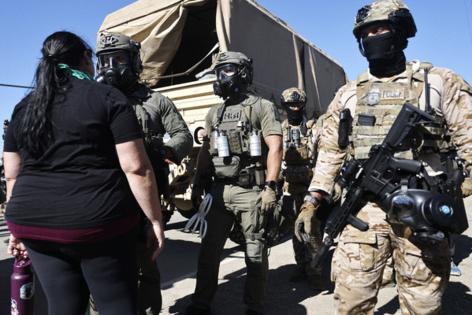Commentary: Authorities devalue the law when they hide behind masks
Published in Op Eds
As a young recruit, the first thing I learned when I pinned on a badge was simple but profound: Power must always be visible and accountable. A nameplate, a badge number, an agency insignia — those aren’t just pieces of metal and cloth. They’re promises that those who wield the authority of the state can be identified, questioned and held responsible for their actions.
That’s why California’s new law, which takes effect Jan. 1, 2026, should be welcomed by anyone who values the rule of law. It will make it a misdemeanor for any law enforcement officer — federal or local — to conceal their identity with a mask during enforcement actions in public spaces such as schools, hospitals or places of worship. The goal is straightforward: When government agents act in the name of the people, the people should know who they are.
Predictably, critics call the measure “political theater.” Some insist that “federal law trumps state law.” Others argue that agents have a “right” to wear masks — and that if they’re arresting undocumented people, “who cares?”
Those claims are not only wrong but betray a fundamental misunderstanding of what policing in a democracy is supposed to look like — and why accountability is not optional.
The line between a lawful arrest and an abduction is thinner than most people realize. What separates them is the ability of the public to identify who is acting under color of law. When that ability is removed, trust collapses and fear takes its place.
We’ve already seen the consequences. In 2024, Maria Ruiz, a U.S. citizen, was detained by masked ICE agents outside her workplace and held without cause for three days. In 2023, masked federal officers stormed a San Diego courthouse and seized a man leaving a family law hearing, causing panic among bystanders. And in 2022, masked agents entered a Central Valley emergency room and detained two patients seeking care.
When the public can’t distinguish law enforcement from a street gang in tactical gear, we’re no longer talking about policing — we’re talking about power untethered from accountability.
The new law is neither radical nor anti-federal. It does not bar immigration enforcement, block arrests or interfere with warrants. It simply requires that those executing the power of the state do so without hiding their identity — with clear exceptions for undercover work and imminent safety threats.
This is well within California’s constitutional authority. States have always had broad powers to protect the safety and civil rights of their residents. And no federal statute requires agents to wear masks. In fact, federal regulations require officers to identify themselves when making arrests. Far from conflicting with federal law, California’s statute reinforces it.
The Supreme Court has also upheld state laws that are neutral, generally applicable and incidentally affect federal operations. California’s law applies equally to everyone with a badge and regulates conduct, not the federal government itself.
The most common defense from Immigration and Customs Enforcement is that masks protect agents from being “doxed” — having their personal information exposed. But every law enforcement officer faces the risk of retaliation. For more than a century, officers have accepted that risk while still showing their faces. We protect them with training, security protocols and laws against harassment — not by granting them anonymity.
Some doxing incidents happen after agencies hide misconduct or refuse accountability. Masking officers doesn’t prevent those situations — it helps create them. And California’s law already allows exceptions when safety is truly at risk.
As a former police commander, I can tell you that no competent executive would allow officers to operate masked and unidentifiable during routine enforcement. If one of my detectives showed up for a warrant service in a face covering, they’d be pulled from the operation before they reached the door.
Professionalism isn’t situational. It doesn’t stop at the state line or end with federal jurisdiction. And it certainly doesn’t change because the person being arrested is undocumented. The standards of legitimacy are the same across the board.
When officers hide their faces, they hide their responsibility. They erode public trust. They chill constitutional rights. And they create the very conditions in which abuse thrives.
California has drawn a bright line — one that says state power must be visible, accountable and answerable to the people it serves. That’s not politics. That’s Policing 101. And it’s a standard that should be embraced by every law enforcement agency in America.
____
Stephen Downing is a retired deputy chief of the Los Angeles Police Department.
_____
©2025 Los Angeles Times. Visit at latimes.com. Distributed by Tribune Content Agency, LLC.
























































Comments